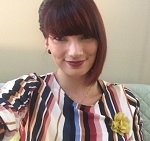Course report
Comprehensive Quality Management in Radiotherapy – Risk Management and Patient Safety - PDF Version
19-22 June 2022, Lisbon, Portugal
Course directors
- Petra Reijnders-Thijssen, manager of quality & patient safety, Maastro, Maastricht, The Netherlands
- Brendan McClean, medical physicist, St Lukes Radiation Oncology Network, Dublin, Ireland
Could you please briefly introduce yourself?
My name is Ilaria Pecorari. I am a clinical engineer by education; I achieved a PhD in nanotechnology, and I am currently working as a systems engineer and risk manager at Cosylab in Ljubljana, Slovenia. I have been working in this radiotherapy-related field for almost two years now.
Why did you choose to attend this course?
One of my main tasks at Cosylab is the management of the risks associated with the products and services we develop. I am involved in the identification, evaluation and mitigation of any potential problem that is connected with the use of our products. Since what we develop is to be used for radiotherapy, I thought that this course would further my knowledge and improve my understanding of critical elements in radiotherapy. I was also intrigued by the fact that the course was meant for the potential users of our products and services (e.g. radiation oncologists, medical physicists, etc.), and I thought I could gain some useful input from them.
What aspects of the course were most interesting to you and why?
I thoroughly enjoyed the whole course. I appreciated the detailed presentation of major incidents in radiotherapy, as this showed the complexity of the radiotherapy environment and highlighted how important it is that all entities involved in radiotherapy (e.g. manufacturers, users, regulatory/law bodies, etc.) share responsibility for safety. I particularly valued the inclusion of some incidents that were associated with systems security, since I consider it crucial that awareness of this topic should be increased.
I enjoyed the open group discussions and workshops, and the fact that the faculty encouraged interaction. All of the above proved to be a source of priceless pieces of information to be taken into account in my daily tasks, from risk management to the usability of the engineering.
Did the course activities improve your knowledge and skills in the relevant subject?
The course allowed me to broaden my horizons and gain a different perspective of risk management in radiotherapy.
I appreciated all the input and tips that were offered by the teachers and other participants. Now I have plenty of resources to look at and use when dealing with risk management. These vary from different methods that I can implement (e.g. product risk management (PRISMA) and a method to identify where new or enhanced controls might be worthwhile, called Bowtie analysis) to the various reporting systems I can consult.
I also found some other topics (e.g. the culture and ethics of radiation oncology) very thought-provoking and informative, and my overall knowledge and skills will benefit from having been “exposed” to them.
Did your course meet your expectations? If so, how?
The course exceeded my expectations, mainly because there was such a breadth of topics that were covered and the impressive amount of input I collected. I must credit the faculty and organisers, as they created a comfortable environment in which interaction and discussions were encouraged, which resulted in an unprecedented learning experience.
List three important takeaways following the course.
Radiotherapy is a multi-step and multi-person process and represents a complex environment in which there is always the potential for accidents and errors that can affect us all. The main goal for people and organisations involved in radiotherapy should be the minimisation of occurrence and heavy consequences of such errors. Everybody, from medical-device manufacturers to hospital personnel and patients, should be engaged in the risk-management effort and should be encouraged to interact with others in order to come up with ideas and solutions to make radiotherapy even safer than it currently is.
How will what you have learned be implemented in your daily clinical practice?
Most of the information I gained from the teachers and other participants will have an impact on my current job. First, I would like to investigate further some topics that were addressed during the sessions, such as systems theoretical process analysis, safety 3.0, and considerations of volatility, uncertainty, complexity and ambiguity, known as VUCA world ‑ just to mention a few. I think they may affect my work and the processes with which I am involved.
Soon, I will certainly make use of what was said in discussions of the Bowtie method, which was that “a picture paints a thousand words”. I will propose and use the Bowtie technique to introduce risk-management-related content to people not directly involved or familiar with it (e.g. higher-level management or newcomers). I have a feeling that it will turn out to be a valuable way to raise awareness of risk management and will draw involvement from more and more people.
How would you encourage someone who has never been to a course run by the European SocieTy for Radiotherapy and Oncology (ESTRO) to join this course?
I highly recommend this course to everybody who works in radiotherapy, from hospital personnel (medical physicists, radiation oncologists, radiotherapy technicians) to product providers and vendors. I think attendance offers a great opportunity to establish fruitful communication among all such staff and the course is designed to bridge any knowledge gaps to improve safety in radiotherapy.

Ilaria Pecorari, PhD
Cosylab
Ljubljana, Slovenia
ilaria.pecorari@cosylab.com